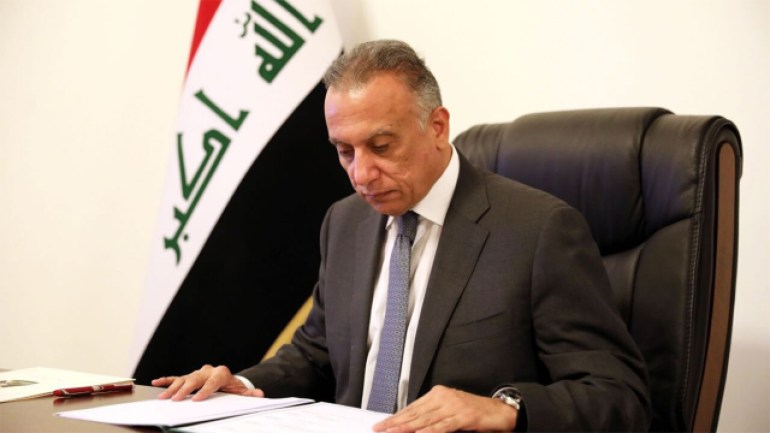The assassination of the Iraqi security expert Hisham al-Hashemi yesterday evening, armed by gunmen in front of his house in Baghdad, raised fears of entering the country in a dark and violent stage, and while the executors are still at large, experts point out that the assassination indicates a tragic shift in the escalating political violence since the start of the popular protests in Last October.
"Armed groups have killed demonstrators and others who are willing to publicly criticize the government and the armed forces, and have escaped punishment," researcher Balkis Willie of Human Rights Watch told the French Press Agency.
"But killing a person in the position of al-Hashemi is a major blow in a country where full impunity encourages some groups to commit grave violations, so you can kill anyone without accountability."
Al-Hashemi, a Baghdad-born, is known for his regular appearances on local and foreign TV channels to analyze the activities of jihadist groups and Iraqi politics, as he was a mediator between several political parties because of his proximity to all of them, which guaranteed him a level of protection.
Another video showing the moment Iraqi security analyst Husham Al Hashimi was assassinated outside his Baghdad home in # Iraq. # Hisham_hashimi pic.twitter.com/FjWiIuER1l
- Heshmat Alavi (@HeshmatAlavi) July 6, 2020
Supportive of the protests,
Al-Hashemi took a strong stand of the popular uprising demanding a comprehensive reform of the Iraqi political system and condemning the loyalty of the previous government to the Iranian camp.
During the wave of protests that lasted 6 months, dozens of activists were assassinated in front of their homes by unknown gunmen who were often riding motorcycles, and the authorities were unable to detect the perpetrators.
A little while ago, the people of Tahrir Square stand in front of the house of the martyr Hisham Al-Hashemi, and they comfort his family and children pic.twitter.com/P1958i6EP2
- Hassan Rahm (@ Hassan_raham2) July 7, 2020
Last September - before the start of the unprecedented demonstrations - pro-Iranian groups on the Internet threatened Hashemi and 13 other Iraqi personalities with death.
Al-Hashemi was attacked, and he was accused, along with others, of being "agents", "traitors to the nation", and "pro-Israel and Americans".
"The standards have changed since the start of the demonstrations in October, as if there is a new way of working and a shift in confrontation with factions loyal to Iran," said Iraqi researcher Adel Bakwan - who was in a relationship with Hashemi.
It will not be the last
and other experts say that the real turning point was last January when Washington assassinated a raid in Baghdad, the commander of the Iranian Quds Force, General Qassem Soleimani, and Abu Mahdi Al-Muhandis, deputy chief of the Popular Mobilization Authority.
Factions within the crowd at the time - especially those loyal to Iran, such as the Hezbollah Brigades - vowed revenge against the United States and its allies inside Iraq at all costs.
As a figure with close ties to Western governments, Hashemi was considered a potential target, and he left Baghdad for a few days in late January.
"Al-Hashemi was aware that things have changed," said researcher Renad Mansour of the Chatham House Institute, who has worked with Hashemi for several years.
He added, "The killing of Abu Mahdi Al-Muhandis unleashed all those groups that he was trying to control and made them subject to a central decision, and we are still, to this day, under the weight of shock shock."
The Iraqi Hezbollah Brigades accused the then intelligence chief, Mustafa Al-Kazemi, of being involved in the assassination, and fiercely opposed his assumption of the post of prime minister last May.
Al-Hashemi has provided advice to Al-Kazemi for many years, and this relationship placed the political researcher in "danger" when the chief of intelligence became prime minister, according to people close to him.
"It is the first time since 2003 that there has been a close alliance between the government and an influential group of intellectuals, and now the people who are symbols of the protests and the government alike are being targeted," he said.
"Al-Hashemi may be the first prominent figure to assassinate him, but he will not be the last. There are other names on this blacklist."
A suicide mission,
Al-Kazemi vowed to hold accountable the assassins of Al-Hashemi, and quickly dismissed the chief of police in the area where al-Hashemi was assassinated.
But there is little hope for real accountability. Less than two weeks ago, Al-Kazimi ordered the arrest of fighters from the Iraqi Hezbollah Brigades on suspicion of launching missile attacks against the Americans, but they were released within days because of insufficient evidence, according to a spokesman for the faction, who vowed to prosecute Al-Kazemi.
Iraqi politician Raed Fahmy sees the killing of al-Hashemi as a challenge to the Al-Kazemi government, and he said in a tweet on Twitter that this “political assassination carries serious warning messages to more than one side, and represents a muzzling of the free word and a challenge to the government and its president and to the approach to reform.”
The assassination of the security expert and researcher Hisham al-Hashemi is not a transient criminal incident of a moderate figure who was distinguished by her accurate knowledge of armed groups, and her boldness in expressing her ideas.
- Raid Fahmi (@raid_fahmi) July 7, 2020
Other Iraqi activists have said that they have long feared being targeted because of their public talk against Iranian-backed groups.
"It would have been none of us," our historian Omar Muhammad said, "Our friends were notified to leave the country immediately," warning that "if Al-Kazemi did not make a strong move, the civilian life in Iraq would disappear, but I fear that he would not." Suicide mission. "

